The absolute monarchs of the early
Chakri Dynasty had a huge role in the development of Thailand.
The influence of colonialism on Southeast Asia was a major factor in
the development of each country. Thailand’s escape from Western colonization was due
to two farsighted kings who were well educated and who understood Western thought.
However, the foreigners did substantially influence the economic and
social growth of the country. The trade that grew as a result of the many treaties with
Western nations pushed over the first domino of modernization.
The absolute monarchs, Rama IV and Rama V in particular, displayed
incredible foresight in their decisions. Colonialism was a huge threat in Southeast Asia
during those early years, and Thailand is the only country in the region never to have
been colonized. It was kept as a buffer state between French Indochina and the British
controlled Burma. The country managed to maintain its independence because the kings
realized that their country could only escape Western control by developing and
westernizing the country. This led to major redevelopment of the country, reorganization
of the government and increased primacy of Bangkok.
The Chakri Dynasty began in 1782 when the capital of Bangkok, or Krung
Thep, was set up in a loop of the Chao Phraya River, after the golden capital of Ayutthaya
was burned by the Khmer. Absolute monarchs reigned the country until 1932 when a
democratic uprising changed the monarchy into a constitutional monarchy. Two of these
absolute monarchs in particular had a vital role in planning ahead for their country. King
Mongkut (Rama IV) who reigned from 1850-1868 and King Chulalongkorn the Great (Rama V) who
reigned from 1868-1910 were the two kings that played the most important roles in
Thailand’s escape from colonization. Rama IV and Rama V were experts in diplomacy as
they strengthened Siam and prevented colonial powers from taking over their country. In
doing so they built an infrastructure, modernized the economy and westernized Bangkok,
creating the city as it is known today.
King Mongkut
King Mongkut was the first monarch receptive to Western influence,
although still wary of Western dominance. He was crowned at age 48 after having been in
the monkhood for 27 years. This was a huge advantage for King Mongkut as the education he
received in the wat helped him understand the West and therefore he knew how to deal with
them tactfully. He realized that if Siam was to be able to meet the Western world on equal
terms, then they must have the modern technology to do so.
Education
The education King Mongkut received as a monk was invaluable. He
learned English which enabled him to read books on modern science, geography, history and
mathematics. His English skills also earned him respect from visiting foreign diplomats.
As a monk, King Mongkut was able to travel around in Siam and meet people on equal terms.
This gave him an open, humane attitude toward his subjects because he saw himself as an
ordinary human being, and thoroughly understood the problems of his people.
Foreign Policy
King Mongkut’s foreign policy consisted of two ideas. He wanted to
avoid confrontation by making concessions, and he wanted to give all Western countries
equal treatment to avoid domination by one. He was responsible for the Bowring Treaty of
1855, which was a treaty of commerce and friendship with Britain. The treaty imposed
concessions on Thailand that limited tariffs on trade and granted extra-territorial rights
to the British. King Mongkut also established other Bowring-type treaties with the United
States, France, Denmark, Holland, Portugal, Belgium, Norway, Prussia, Sweden and Italy.
The effects of these treaties on the capital and government systems
were substantial. Although the treaties helped avert colonialism, problem areas arose
within Thailand’s traditional economic and legal system. The country needed to
modernize fast to accommodate the increase in trade, production and services. Canal
digging and road construction began. Ships were built both to modernize the navy and to
catch the overflow of trade. The army was reorganized. Many Europeans were employed to
reorganize the government. These foreign ministers were all from different countries. The
British advised on financing, the French helped reorganize the law system and the
Americans were trusted to help advise on foreign affairs. With their help, the King
modernized the country and centralized the government.
Domestic Policy
Thailand’s first mint was established around this time, along with
new programs in schools that encouraged the study of foreign languages. Rice was beginning
to be exported so new canals needed to be dug and new markets opened. The allowance of
farangs, or foreigners into Bangkok for trade caused the construction of new buildings and
roads. The New Road on the east side of the river was built at this time and new buildings
were built along it to accommodate the growing businesses. Other roads were constructed
soon afterwards, as the King was ashamed of the condition of the streets and wanted to
change their appearance. At this time roads existed only in the center of the city and
near markets, but the entire nature of the city changed. Bangkok was changed from its
traditional small-scale economy to one focused on manufactured goods and exports.
King Chulalongkorn the Great
King Chulalongkorn the Great (Rama V) reigned for 42 years, from
1868-1910. He continued the far-sighted reforms of modernization that Mongkut had begun.
King Chulalongkorn had prided himself on the methods with which he westernized Siam
without subjecting it to foreign control, but King Chulalongkorn was very pragmatic in his
reforms. He was critically selective of which reforms to implicate because he did not want
to erase any traditional values. The most famous of his reforms was the abolition of
slavery. He pronounced every person born during his reign free, and took steps to liberate
the present slaves by creating incentives for their owners.
Domestic Policy
King Chulalongkorn made other important internal reforms as well. He
expanded the communication and transportation system by building the first railroad, post
and telegraph services. These new networks had two great effects on the growth of
Thailand. First of all, every system originated in Bangkok and radiated out to the
provinces, re-strengthening Bangkok’s primacy. Railroad lines were a good example of
this. Not only were the provinces accessible to the city, the city became more accessible
to the rural community and as a result, rapid urbanization took place. Second of all,
these developments gave the Thai government much more control over the provinces. The
government was able to send officials to the provinces and replace the old ruling families
with those more favorable to the Chakri throne. Schools were promoted in the provinces
where the Thai language was taught to give the country a common language. All of these
reforms and more resulted in the national integration of the entire country. With the
government in control of its outer provinces, there was less of a chance of colonial
takeover. Thailand was united and the national identity that had formed made it harder for
colonists to take over parts of the country.
Rama V also sent many students to study abroad for their education. He
wanted them to return and be capable of replacing the foreign advisors that King Mongkut
had used. King Chulalongkorn also created more government ministers using the West as a
model, and thereby centralized the government even more.
King Chulalongkorn also established a variety of public utilities.
Health and educational standards for the public were improved. He developed criminal and
civil courts, a police force, hospitals, universities and a teacher’s college.
Chulalongkorn often traveled through Thailand to personally investigate and share his
subject’s conditions. These trips not only made him more aware of what was going on
in his country, it also made him more popular with the people.
Result of domestic policy
King Chulalongkorn’s domestic policy was very successful. The
colonists’ White Man’s Burden excuse was no longer applicable. Thailand had
gained the respect of the foreigners who saw it as stable, modern, able to protect treaty
rights and promote trade, all of which were ideal for the westerner’s needs.
Foreign Policy
King Chulalongkorn’s foreign policy was also very successful. He
had traveled extensively in Europe in 1897 and met the European royalty on equal terms. He
was the first Thai monarch to travel to the west. He knew English well and therefore had
read books on Western history and was determined to resist their domination. He knew their
strength and tactics and knew that Thailand could never use force against them and still
be successful. Instead, Chulalongkorn based his foreign policy on establishing equal
rights for all European powers. He did not want any confrontations and therefore managed
to continue friendly relations with each country.
King Chulalongkorn made several land concessions to the French and
British. To the French he granted Laos in 1893, which had been kept as a sort of buffer
state between Siam and French Indochina. Parts of Cambodia, including Angkor Wat, had been
ceded to the French in 1867. The southern Malay states were taken by the British in 1909
and thus the borders of present day Thailand were established.
In order for the country to be accepted as independent and a buffer
state, the country needed to reform. Both Rama IV and Rama V foresaw this potential
problem, and although it appears that they ceded many rights away, they managed to
maintain their country’s independence and dignity. |
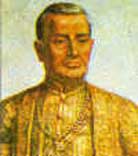
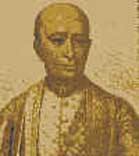
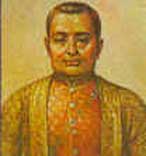
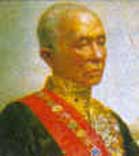 H.M. King Mongkut
H.M. King Mongkut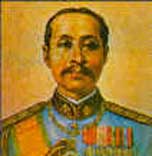 H.M. King Chulalongkorn the Great
H.M. King Chulalongkorn the Great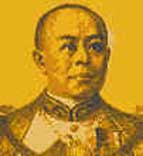 H.M. King Vajiravudh
H.M. King Vajiravudh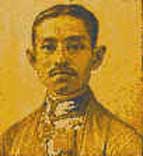
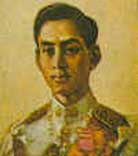
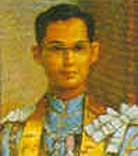 Great
Great